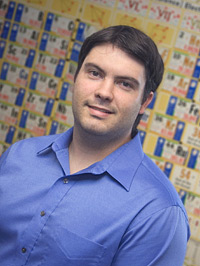Interview with Andrew Cahoon
Andrew Davis Cahoon joined Colby-Sawyer College in fall 2007 as a visiting faculty member in the Natural Sciences Department.

How did you learn about Colby-Sawyer College, and what led you to pursue a faculty position here?
I was directed to the job advertisement by a friend working at another school. I pursued the opportunity to work at Colby-Sawyer because of the nature of the position. They were looking for someone with a physics background to teach physics and also endeavor into other subjects like math, astronomy and geology.
My research in graduate school involved the physics of ice crystal growth so I was interested in a position that would be interdisciplinary in a similar way.
What are your academic areas of expertise and interest?
My area of expertise is physics, specifically condensed matter physics, and even more specifically, the physics of ice surfaces. I am interested in how snowflakes form and how they can be modeled by differential equations.
Which class(es) are you teaching this semester? What is your favorite class to teach?
I am teaching College Algebra, Statistics and Calculus. My favorite class to teach is Introductory Physics because of the great range of topics and demonstrations. I tend to be a visual learner myself and have always liked to see science in action.
What do you enjoy and find most challenging about teaching?
What I enjoy most is working through homework problems in office hours. To enjoy and be successful at science or math, you need to get your hands dirty, so to speak. It's always satisfying when students come in to my office lost and leave with some sort of orientation and a decent map.
The most challenging aspect about teaching is managing class time so that material is covered at the right pace for absorbing the ideas and putting them into practice. My approach to teaching is to be very flexible to the students' needs.
I generally present the concepts over a couple classes and then practice them with in-class assignments. My method of presentation and the types of assignment will vary with what I think the class will benefit from most.
I like to have students do a lot and aim to generate a lot of questions. For this reason, I like to give assignments that contain both easy problems that can be done fairly quickly and hard problems that I know students will struggle with.
I hope to build relationships that are casual and respectful. I'd like students to feel that they can approach me if they are totally lost in the class or if they are just missing one tiny element of an assignment.
I also want to impart on my students a high level of respect for the subject so that they hold themselves to a high standard in the work they do. And I try to be respectful of their workload and the fact that they have other classes beside mine to divide their attention.
What were you doing prior to joining the faculty here?
I was a graduate student at Yale University, where I also taught and was a teaching assistant for some introductory and advanced physics courses.
What are your research interests and briefly describe your work in this area (or areas).
I am interested in physics that happens on the surface of ice. A particular phenomenon that I am working on is the melting of the surface of ice below the freezing point. It is common knowledge that water freezes at 32 degrees Fahrenheit, but the surface will actually be covered by a thin layer of water well below that.
Pre-melting, as it is called, is known to play a role in many geophysical settings. In fact, it is a principle factor in the charge separation that happens in thunderclouds. And it is expected to also be a principle factor in the shapes that ice crystals take as well. My work aims at understanding this phenomenon better and modeling it with differential equations.
Where are you originally from?
I was born in Fairbanks, Alaska, where I lived for about one year. Then I grew up in Southern Maine near Portland. I am the big brother to three siblings: one brother and two sisters. We all went to Windham High School, where I graduated in 1998.
What are your early impressions of life at Colby-Sawyer and in the New London area?
I'm very happy here at Colby-Sawyer so far. I find the college extremely welcoming and am enjoying the college atmosphere. I haven't really had enough experience with New London to say much about the town yet.
Tell us about some of your other interests and what you like to do in your free time.
I am married with a 1 ½-year-old daughter and a second daughter on the way in late December. My wife and I used to spend our free time at a movie theater or going to nice restaurants. Now we spend most of our non-working time playing with toys on the floor and watching “Curious George.”
However, after 8 p.m., I am an avid sports fan, particularly of baseball. And I take any chance to get out and play softball or a pick-up basketball game. I'm interested in just about any competitive sports. I played both baseball and badminton in college until my studies took over.
Do you have a sense of what you'd like to accomplish in your first year at Colby-Sawyer?
I'd like to connect with the student population and get to know them better. Also, since this is my first time teaching the courses that I have, I would like to gain an understanding of what activities/assignments work well and improve or replace the ones that do not.


